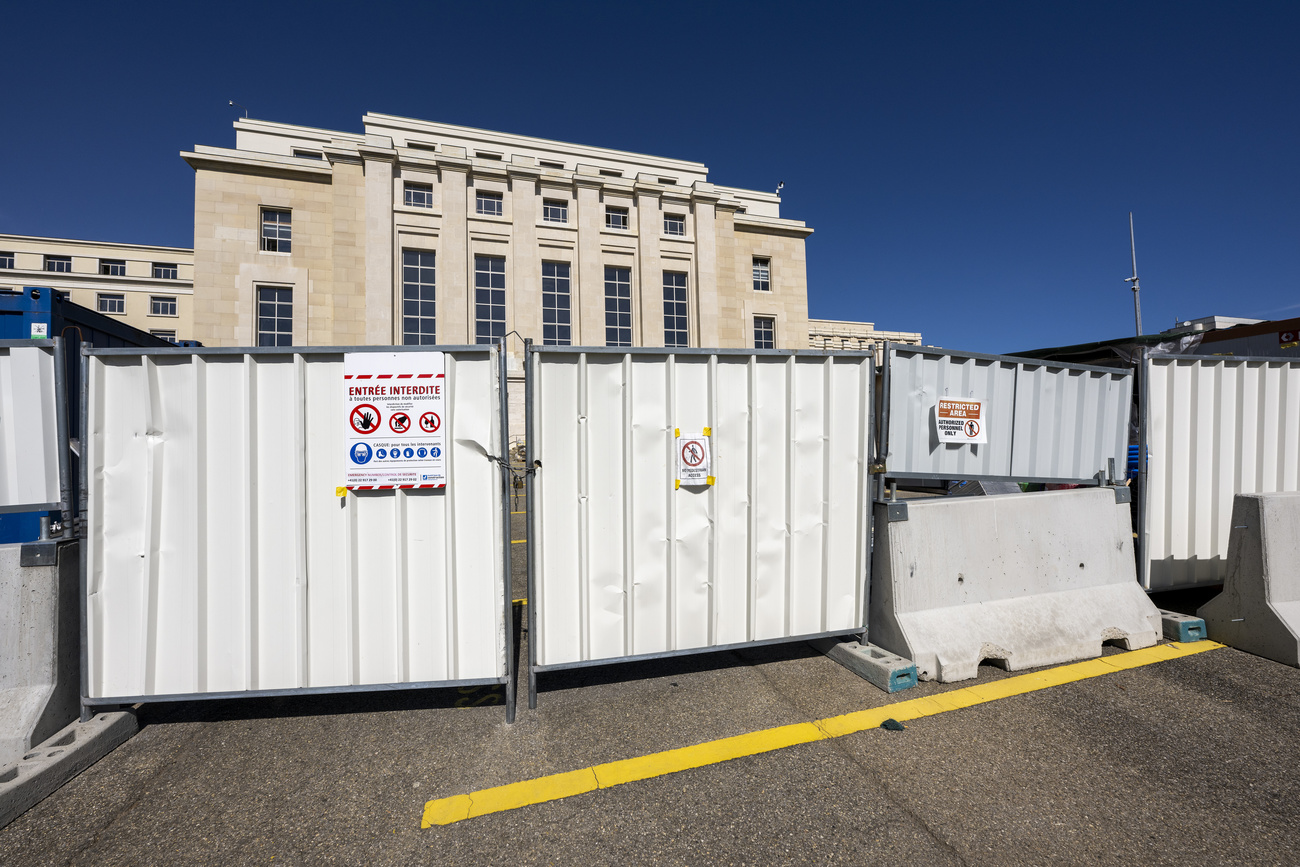
Lights out for the UN Palais des Nations

The United Nations Office at Geneva is facing a severe funding shortfall, causing temporary closures of the building and power disruptions. SWI swissinfo.ch takes a look at why its budget is in the red.
Today, the over 200,000 square metres of the landmark Palais des Nations in Geneva will remain in the dark. This is the first time in the history of the building that it has had to shut down.
A diplomatic hub, the UN Office at Geneva (UNOG), which organises about 8,000 meetings a year to facilitate international cooperation, is struggling to pay its bills due to a surge in electricity prices. Energy prices of households have gone up by 27% this year in Switzerland, mainly fueled by a supply crunch due to the Covid-19 pandemic and geopolitical tensions. Such inflation was not accounted for in the regular 2023 UN budget, which was decided in December 2022 by the General Assembly.
In a bid to save energy and operation costs, from October the UNOG was forced to impose cost-saving measures at the Palais des Nations. These include limiting the use of escalators, lighting, reducing heating and air conditioning, shortening the opening hours of the buildings and minimising the use of some of the conference rooms. The Library Building is now closed every Friday. The full closure of the Palais for more than two weeks from December 20 is forcing some 1,600 UN staff to resort to working from home.
“While I am concerned that the current liquidity crisis is indeed having an impact on our operations, I am confident that the measures we took can mitigate these negative effects”, Tatiana Valovaya, Director-General of the UNOG, tells SWI swissinfo.ch.
UNOG expects the offices to operate as usual from January 8. But further reductions in energy consumption will be needed next year as well.
Electricity prices surge
UNOG’s electricity bill has doubled every year in 2021, 2022 and 2023. “The total price increase from 2021 to 2023 is a net of 344%”, explains Kira Kruglikova, director of administration at UNOG. The UN said it could not disclose private contract details with the supplier.
The Palais des Nations is a huge consumer of electricity. It has to keep 34 conference rooms and 59 elevators running.
From January to October 2023, it consumed 13.2 million kWh for a cost of CHF7.2 million ($8.3 million). That compares with a consumption of 14.4 million kWh the previous year for a much lower cost of CHF3.9 million.
Liquidity crisis
The temporary closure of the Palais des Nations comes on the back of a severe liquidity crisis for the whole of the UN. The UN Secretariat was allocated a regular budget of $3.396 billion for 2023, slightly more than in 2022 ($3.12 billion).
The regular budget, also called assessed contributions, is mainly used to pay staff and ensure the smooth operation of the UN as a whole. These contributions are funded by the member states based on GDP and the capacity of each country. The UN also receives voluntary contributions from countries, organisations, and individuals for specific purposes or projects.
Just 2.2% of the global budget goes to Geneva ($77.7 million). Most of this money is allocated to staff salaries, and the remainder to general operating expenses, including energy costs ($18.8 million).
This year the UN has been unable to cover its budget. Though this is not uncommon, the gap between what was budgeted and what was received is particularly wide.
Some member states have delayed or not paid their budget in full. The UN has also had to deal with unexpected expenses on top of surging global electricity prices.
The closure of the peacekeeping mission in Mali, established in 2013 to assist the country after a coup, also incurred additional costs. This closure, prompted by a request of the Malian government, forced the UN to repatriate personnel and equipment, as well as to compensate staff. None of these expenses had been budgeted for last December.

“Due to late payments from member states, the liquidity crisis is affecting the UN Secretariat as a whole”, notes Kruglikova. The UNExternal link says that about 50 member states out of 193 have not fully paid their contributions for the 2023 regular budget. The largest overall contributor to the UN system, the United States, is among them.
The US mission in Geneva says that it had earmarked a total of $707 million for the UN in 2023, of which “$200 million has been paid in line with short-term Congressional funding resolutions”. The US contributions to the UN have to be approved by Congress every year. It is still unknown how much the US will contribute to the UN regular budget for 2023.
“The liquidity crisis is worsening”, says Alessandra Vellucci, director of the UNOG’s Information Service. But the precise amount of current financial shortfall in UNOG’s operation remains undisclosed.
The UN Secretary-General, Antonio Guterres, addressing the General Assembly’s budget committee in October, cautioned that “as in the recent past, programme managers will strive to minimise the negative impact on programme delivery. But protracted cash conservation measures, including the suspension of hiring, will impact the delivery of some mandates”.
He expressed concern over the deteriorating liquidity situation of the UN, and urged countries to ensure timely and full payments.
The UN may have to reduce or stop some of its activities and programs, or delay payments to its staff, contractors, and partners. At present, Vellucci says, there are no plans to lay off staff.
Edited by Virginie Mangin/gw
More
UN activities in Geneva hampered by financial constraints


In compliance with the JTI standards
More: SWI swissinfo.ch certified by the Journalism Trust Initiative



































You can find an overview of ongoing debates with our journalists here . Please join us!
If you want to start a conversation about a topic raised in this article or want to report factual errors, email us at english@swissinfo.ch.